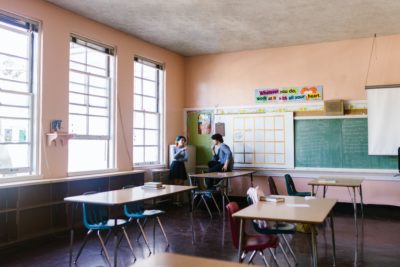
|
|
Staff from the Department of Public Instruction (DPI) presented on several of the department’s short session priorities at Wednesday’s State Board of Education meeting, including efforts concerning math, literacy, and low-performing schools.
The short session begins on April 24.
DPI’s discussion follows the State Board of Education’s approval of legislative priorities last month. State Superintendent Catherine Truitt said at the time that she shares the same priorities, along with an explicit focus on school performance grade redesign.
“In furtherance of its vision and mission, the State Board focuses its advocacy over the next few months on funding requests appropriate for the short session and acutely designed to directly impact students and schools,” the Board’s legislative priorities document says.
Here are the priorities approved by the Board last month:
- $4.5 million to continue funding efforts to transform schools designated as low performing.
- A joint ask with the N.C. Department of Health and Human Services (DHHS) around evidence-based prevention and early intervention that addresses topics Secretary Kody Kinsley and his team presented to the State Board on Jan. 31, to be finalized by Board leadership with N.C. DHHS.
- Support DPI’s efforts for a statewide policy framework for math that includes an early math screener and professional development for elementary math teachers.
- Support for DPI’s efforts to expand Read to Achieve professional development to middle grades teachers.
- The expansion of early literacy screener contract from K-3 to include fourth and fifth grades.
Sign up for the EdWeekly, a Friday roundup of the most important education news of the week.
During Wednesday’s Board meeting, DPI staff focused on a statewide policy framework and early math screener for math, DPI’s literacy measures and professional development, and efforts to support low-performing schools.
Here’s a closer look at those priorities.
Reforming math
Current math standards were implemented in stages after N.C. public schools began teaching math using Common Core standards in 2012.
- Math 1, Math 2, Math 3: 2016-2017
- K-8 Math: 2018-2019
- Math 4: 2020-2021
K-12 math standards are set to be reviewed in the 2024-25 school year. Any recommendations for revising the standards will go to the Board in the summer of 2025.
In November, DPI presented “a comprehensive math reform package” to the Board, emphasizing a need for changes in how math is taught in the state.
Here’s what DPI said that package would include.
- A request for an early math screener for all elementary grades.
- Policies for guidelines on best instructional practices for math teachers, as well as recommendations for standards-aligned math curriculum.
- A statewide system of supports for K-8 math teachers to include state-funded math professional development and coaching.
- Policies for comprehensive math intervention programs aligned to Multi-Tiered System of Supports (MTSS), which focuses on evidence-based practices to achieve improved outcomes for students.
The changes are meant to better prepare all students for the Math 1 course, which some students take in middle school, but many take in high school.
“Most kids are not proficient in Math 1, or Algebra 1 as other places might call it,” Truitt said in November. “But we know that is the gateway for secondary success, and with the number of jobs that are available now and coming down the pipe in AI, machine learning, computer science — Algebra 1 is going to be the gateway to those career fields.”
The reform package is also meant to encourage more student interest in math — and to build confidence for others. Wednesday’s presentation highlighted gaps in math performance among student groups — including Black, Hispanic, male, and low-income students.
DPI Deputy State Superintendent Dr. Michael Maher shared a few math initiatives with the Board on Wednesday:
- Legislation to broaden participation in advanced math courses through auto-enrollment polices. Maher presented this work to lawmakers last month.
- Review of math standards, as outlined above.
- Professional development platform for elementary math teachers, Patterns for Reaching and Impacting Students in Math (PRISM). The professional development is expected to begin full implementation in January 2025, according to Maher’s presentation.
“The best professional athletes have all kinds of coaches, so to say that teachers don’t also need coaches… we certainly need coaches,” Maher said, regarding the importance of professional development.
Finally, Maher presented on DPI’s strategies to ensure all students are prepared for Math I.
Those strategies include providing a guide for selecting instructional materials, providing “a system of support” for math teachers, and requiring schools “to provide assessment systems for all educators who teach math in grades Kindergarten through 8… to ensure teachers have information related to student growth and proficiency necessary for effective instruction and intervention.”
DPI’s math reform package also includes parental notification regarding student progress, evidence-based math intervention programs for K-8 students, and an Innovative Math Accelerator Grant Program. That program is intended to provide ongoing “professional learning for math coaches, building-level leaders, and district-level leaders, empowering them to reinforce high-quality instruction in middle school classrooms.”
Here’s a look at DPI’s anticipated costs for Math I preparation:
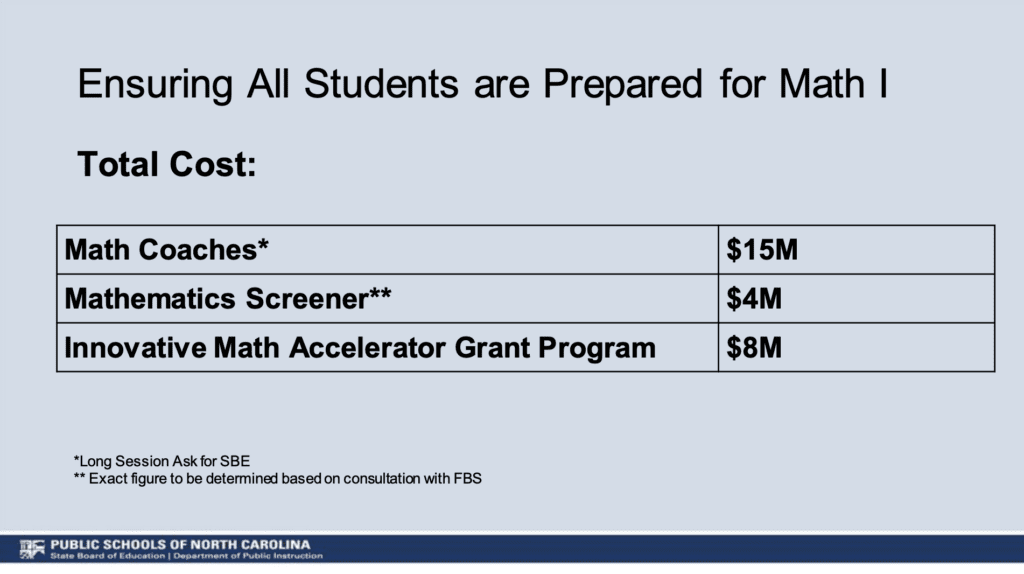
Improving literacy in later grades
DPI’s Office of Early Learning Director Amy Rhyne presented on DPI’s efforts to “expand student literacy measures and scope to support students in grade four through eight.”
In 2021, N.C. lawmakers updated the Excellent Public Schools Act to emphasize the use of the science of reading to ensure students in elementary schools can read on grade level by grade three.
Board members and DPI staff have previously said that literacy efforts cannot stop in the third grade.
“Data indicates support is necessary beyond grade three,” DPI’s presentation says. “Not all students learn at the same pace/rate — (this) provides opportunity for educator professional knowledge aligned to science of reading, core instructional practices and continuous intervention supports.”
Read more
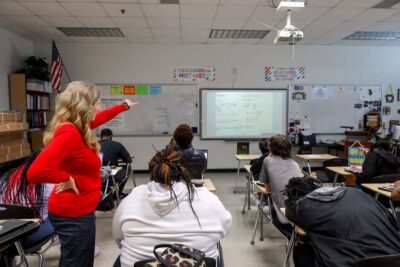


In addition to expanding support for fourth to eighth grade students, Rhyne outlined the following initiatives, among others. Most of these initiatives involve expanding upon what is already outlined in the Excellence of Public School Act.
- Expand professional development platform Lexia Aspire for all content educators in grades six through eight.
- Add secondary education general curriculum teachers to educator prep program (EPP) requirements, to provide “long term sustainability related to NC teacher pipeline.”
- Update Literacy Instruction Standards to include grades six through eight.
- Update Literacy Intervention Plans to include grades four through eight.
- Update Individual Reading Plans to include grades four through eight.
- Expand statewide formative diagnostic reading assessment through grade five.
Here’s a look at the budget request for those items.
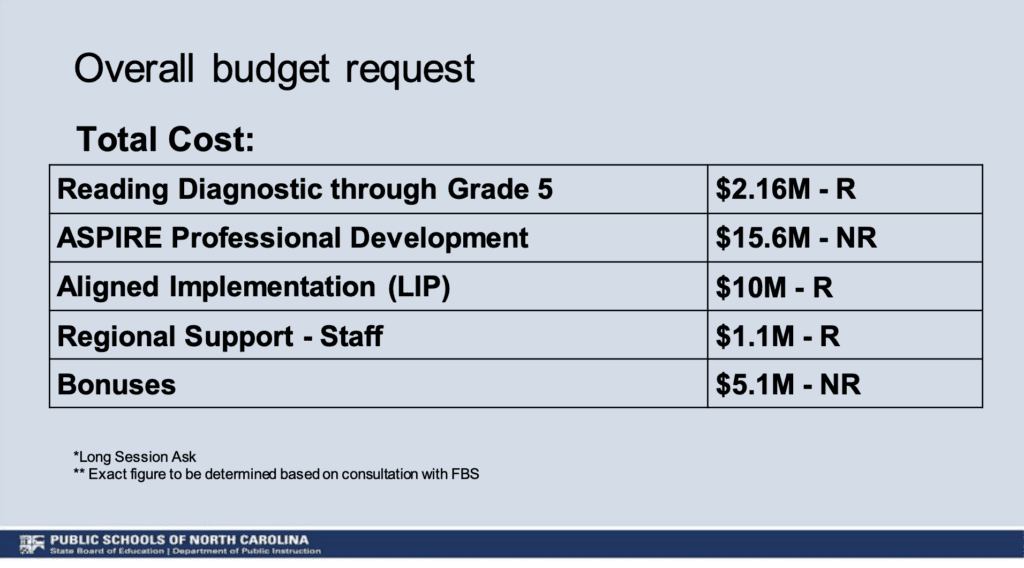
Support to low-performing schools
Low-performing schools are those that earn an overall school performance grade of D or F and a school growth score of “met expected growth” or “not met expected growth,” according to state statute.
In 2022-23, there were a total of 804 low-performing schools in the state and 25 low-performing school districts, according to a recent report. There are 60 fewer low-performing schools than last school year and four fewer low-performing districts.
Sign up for the EdDaily to start each weekday with the top education news.
In 2021, CARES was launched as the “the highest level of intervention within the Department of Public Instruction” for low-performing schools. The intervention program helps to identify what causes challenges in low-performing schools and to intervene with support to bolster the school’s achievements and performance.
You can read EdNC’s previous reporting on the CARES program here.
On Wednesday, Deputy State Superintendent of District and School Support Services Dr. Jeremy Gibbs said DPI’s goal is “to continue and refine ongoing support efforts to low-performing districts and schools beyond September 30, 2024.” At that point — when ESSER funding runs out — funding for CARES programming will also end.
The CARES model includes professional learning, coaching, systems design, and capacity building.
DPI is asking lawmakers for a $4.5 million grant “to continue targeted support for improvement in low-performing schools beyond October 1, 2024.”
At that point, the CARES model would be renamed “Thrive.”
Gibbs said the new name is fitting for the department’s goals.
“The definition of the word is… to grow vigorously and flourish, to make progress, or realize a goal, despite the circumstances,” he said.
Here’s a breakdown of where the $4.5 million request would go, if funded.
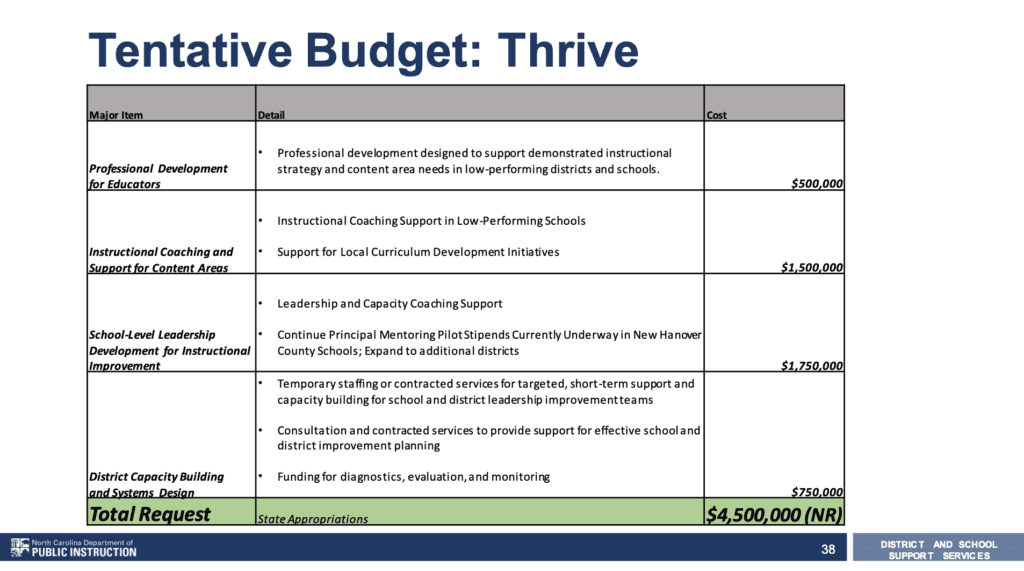
DPI plans to bring its “next iteration of state support to low-performing schools” during the 2025 long session, Gibbs said.
Truitt said she hopes lawmakers will allow CARES supports to continue, but that school performance grade redesign will help schools most.
Last month, Truitt presented DPI’s proposal for school grades to lawmakers. Under that proposal, schools would receive four different grades, on academics, progress, readiness, and opportunity. To move forward, the model requires legislative action.
“Our ultimate goal is that the new school performance grade model would give the legislature, the board, and the department the data and information that it needs to be able to do what is necessary for our students who are in low-performing schools,” Truitt said.
Recommended reading

